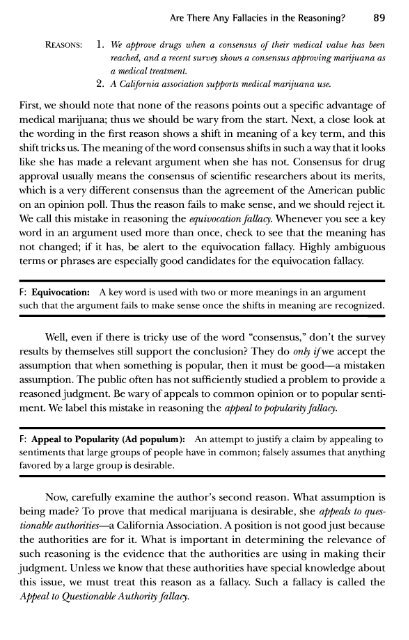Asking the Right Questions, A Guide to Critical Thinking, 8th Ed
Asking the Right Questions, A Guide to Critical Thinking, 8th Ed
Asking the Right Questions, A Guide to Critical Thinking, 8th Ed
Create successful ePaper yourself
Turn your PDF publications into a flip-book with our unique Google optimized e-Paper software.
Are There Any Fallacies in <strong>the</strong> Reasoning? 89<br />
REASONS:<br />
1. We approve drugs when a consensus of <strong>the</strong>ir medical value has been<br />
reached, and a recent survey shows a consensus approving marijuana as<br />
a medical treatment.<br />
2. A California association supports medical marijuana use.<br />
First, we should note that none of <strong>the</strong> reasons points out a specific advantage of<br />
medical marijuana; thus we should be wary from <strong>the</strong> start. Next, a close look at<br />
<strong>the</strong> wording in <strong>the</strong> first reason shows a shift in meaning of a key term, and this<br />
shift tricks us. The meaning of <strong>the</strong> word consensus shifts in such a way that it looks<br />
like she has made a relevant argument when she has not. Consensus for drug<br />
approval usually means <strong>the</strong> consensus of scientific researchers about its merits,<br />
which is a very different consensus than <strong>the</strong> agreement of <strong>the</strong> American public<br />
on an opinion poll. Thus <strong>the</strong> reason fails <strong>to</strong> make sense, and we should reject it.<br />
We call this mistake in reasoning <strong>the</strong> equivocation fallacy. Whenever you see a key<br />
word in an argument used more than once, check <strong>to</strong> see that <strong>the</strong> meaning has<br />
not changed; if it has, be alert <strong>to</strong> <strong>the</strong> equivocation fallacy. Highly ambiguous<br />
terms or phrases are especially good candidates for <strong>the</strong> equivocation fallacy.<br />
F: Equivocation: A key word is used with two or more meanings in an argument<br />
such that <strong>the</strong> argument fails <strong>to</strong> make sense once <strong>the</strong> shifts in meaning are recognized.<br />
Well, even if <strong>the</strong>re is tricky use of <strong>the</strong> word "consensus," don't <strong>the</strong> survey<br />
results by <strong>the</strong>mselves still support <strong>the</strong> conclusion? They do only if we accept <strong>the</strong><br />
assumption that when something is popular, <strong>the</strong>n it must be good—a mistaken<br />
assumption. The public often has not sufficiently studied a problem <strong>to</strong> provide a<br />
reasoned judgment. Be wary of appeals <strong>to</strong> common opinion or <strong>to</strong> popular sentiment.<br />
We label this mistake in reasoning <strong>the</strong> appeal <strong>to</strong> popularity fallacy.<br />
F: Appeal <strong>to</strong> Popularity (Ad populum): An attempt <strong>to</strong> justify a claim by appealing <strong>to</strong><br />
sentiments that large groups of people have in common; falsely assumes that anything<br />
favored by a large group is desirable.<br />
Now, carefully examine <strong>the</strong> author's second reason. What assumption is<br />
being made? To prove that medical marijuana is desirable, she appeals <strong>to</strong> questionable<br />
authorities—a California Association. A position is not good just because<br />
<strong>the</strong> authorities are for it. What is important in determining <strong>the</strong> relevance of<br />
such reasoning is <strong>the</strong> evidence that <strong>the</strong> authorities are using in making <strong>the</strong>ir<br />
judgment. Unless we know that <strong>the</strong>se authorities have special knowledge about<br />
this issue, we must treat this reason as a fallacy. Such a fallacy is called <strong>the</strong><br />
Appeal <strong>to</strong> Questionable Authority fallacy.



